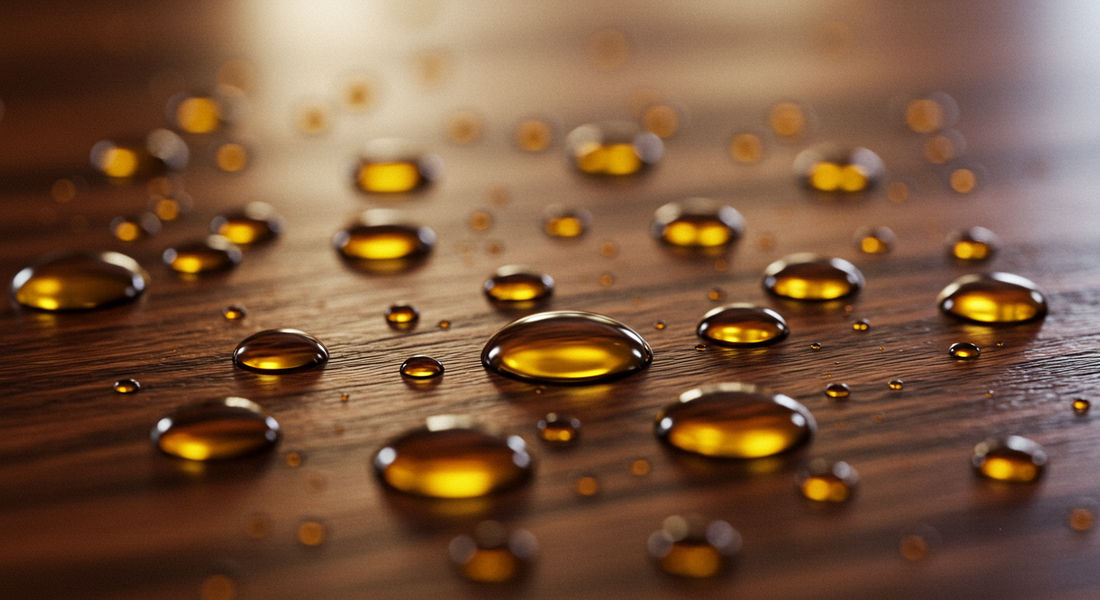
How Jojoba Oil Moisturizer and Vitamin E Boost Skin Barrier Repair and Moisture Lock
Share
Introduction
In the realm of natural skincare, jojoba oil moisturizer and vitamin E are powerful allies in enhancing skin barrier repair and locking in much-needed moisture. As consumers increasingly seek organic balm solutions that combine traditional ingredients with modern efficacy, natural skin balms like manuka honey balm, tallow skincare, and shea butter balm come to the forefront. These ingredients provide deep hydration while offering holistic benefits, such as anti-inflammatory properties and rapid skin absorption, making them ideal for sensitive skin and specialized care, including psoriasis skin care.
Unlocking the Power of Manuka Honey Balm and Tallow Skincare for Ultimate Skin Barrier Repair
How Manuka Honey Balm’s antibacterial properties support eczema and psoriasis skin care
Manuka honey balm is notable for its antibacterial compound, methylglyoxal, which distinguishes it from standard honey varieties. This potent antibacterial action mitigates infection risks associated with eczema and psoriasis skin care routines. By reducing bacterial overgrowth, manuka honey balm accelerates wound healing and calms inflammation, facilitating skin barrier repair for sensitive and compromised skin.
In addition to its antimicrobial properties, manuka honey balm soothes irritated skin while delivering essential nutrients. Its humectant nature attracts moisture, enhancing hydration without clogging pores, making it an excellent choice for individuals needing both protection and nourishment.
Tallow skincare’s lipid profile: Mimicking natural sebum for deep hydration and skin barrier repair
Tallow skincare holds remarkable potential due to its lipid composition, which closely mimics human sebum. This similarity allows tallow to integrate seamlessly into the skin’s lipid barrier, repairing damage while providing intense hydration. Unlike many conventional moisturizers, tallow skincare penetrates deeply, effectively restoring skin barrier integrity.
For those with dry or compromised skin, tallow’s natural fatty acids nourish and strengthen the skin’s protective layer. This makes tallow skincare particularly beneficial for skin barrier repair and managing conditions like psoriasis that require moisture retention and anti-inflammatory support.
Combining vitamin E and olive oil with natural skin balms for enhanced anti-inflammatory effects
The synergy of vitamin E and olive oil with natural skin balms elevates the skin-healing experience. Vitamin E, a potent antioxidant, protects the skin against free radical damage and supports cellular repair mechanisms essential for skin barrier repair. Olive oil enhances this by providing essential lipids and additional antioxidants, boosting the anti-inflammatory properties of natural skin balms.
When combined with manuka honey balm or tallow skincare, this trio accelerates skin regeneration while locking in moisture—a vital factor for sensitive skin moisturizer routines. This blend supports emerging trends in skincare that emphasize organic balms for both face and body, offering functional benefits derived from nature.
Top Natural Ingredients for Sensitive Skin Moisturizer: Shea Butter Balm and Jojoba Oil Moisturizer Explained
Why shea butter balm is essential for nourishing dry, sensitive skin with fatty acids and vitamins
Shea butter balm is celebrated for its high concentration of fatty acids and vitamins A and E. These components nourish dry, sensitive skin by restoring lipid balance and reinforcing natural barriers. Shea butter’s emollient properties soften rough skin textures, and its vitamin content aids in gentle cell repair and anti-inflammatory effects.
Since sensitive skin often struggles with irritation and dryness, incorporating shea butter balm into daily moisturizing routines provides a calming, protective shield. Its rich texture is particularly valued in natural skin balm formulations targeting rapid skin absorption and prolonged hydration, aligning with modern preferences for effective yet gentle moisturizers.
Jojoba oil moisturizer as a non-comedogenic option packed with antioxidants for sensitive skin
Jojoba oil moisturizer stands out in natural skincare as a non-comedogenic ingredient that closely resembles the skin’s own sebum without clogging pores or triggering breakouts. Packed with antioxidants, including vitamin E and other essential nutrients, jojoba oil moisturizes while offering anti-inflammatory benefits, making it ideal for sensitive skin moisturizer formulations.
Its lightweight, fast-absorbing nature complements the trend towards balms designed for triple lock moisture—balms that hydrate deeply while retaining moisture for extended periods. Regular use of jojoba oil moisturizer can soothe dryness, minimize irritation, and support skin barrier repair, helping maintain a balanced, healthy complexion that resists external stressors.
The role of natural skin balm formulations in soothing inflammation and locking in moisture fast
Natural skin balms combine various ingredients like shea butter balm, jojoba oil, and olive oil to create formulas engineered for rapid skin absorption and efficient moisture retention. These balms act as a protective layer that locks in hydration, preventing transepidermal water loss while addressing inflammation common in sensitive and damaged skin.
Such formulations are particularly beneficial for conditions requiring sustained skin barrier repair and anti-inflammatory support, including eczema and psoriasis skin care. The blend of fatty acids, antioxidants, and humectants ensures a triple lock moisture effect, making them essential in both daily and treatment-focused skincare regimens.
DIY Organic Balms for Face and Body: Triple Lock Moisture with Olive Oil, Vitamin E, and Shea Butter Balm
Step-by-step guide to making a fast skin absorption balm using olive oil and vitamin E
Creating a DIY organic balm allows for customization with skin barrier repair ingredients. Here’s a simple recipe utilizing olive oil, vitamin E, and shea butter balm for triple lock moisture:
- Melt shea butter balm: Gently warm 1/2 cup of pure shea butter balm in a double boiler until it becomes liquid.
- Add olive oil: Stir in 1/4 cup of organic olive oil, enhancing hydration and nourishment.
- Vitamin E infusion: Pierce 2-3 vitamin E capsules and mix the oil into the blend, adding antioxidant and anti-inflammatory benefits.
- Cool and whip: Allow the mixture to cool until opaque, then whip with a hand mixer for a creamy, fast-absorbing texture.
- Store: Transfer the balm into a sterilized jar and store it in a cool, dry place for up to three months.
This balm rapidly locks in moisture while facilitating intensive skin barrier repair, making it suitable as a sensitive skin moisturizer or general body balm.
Benefits of triple lock moisture retention in natural skin balms for all skin types, including sensitive skin moisturizer
Triple lock moisture technology in natural skin balms involves a formulation strategy that combines:
- Hydration enhancement: Ingredients like olive oil and jojoba oil attract and retain water molecules.
- Skin barrier repair: Fatty acids from shea butter balm restore lipid layers.
- Moisture retention: Thick balm textures create a seal that prevents moisture loss.
Together, these mechanisms keep the skin hydrated, soft, and resilient throughout the day, benefiting all skin types, especially sensitive skin where rapid absorption and long-lasting effects are crucial.
Incorporating jojoba oil moisturizer and shea butter balm for a vintage, nourishing balm experience
Combining jojoba oil moisturizer with shea butter balm revives traditional skincare wisdom, where natural ingredients provided benefits beyond surface hydration. Jojoba oil’s lightweight, antioxidant-rich profile complements shea butter balm’s emollient richness, creating a blended balm that is fast absorbing yet deeply moisturizing.
This combination meets the demand for organic balms for face and body, which aligns with sustainable and natural skincare—ideal for those seeking an effective, vintage-inspired moisturizer that supports skin barrier repair and soothes sensitive skin.
Transforming Psoriasis Skin Care with Vintage Natural Skin Balms: Evidence-Based Benefits and Trends for 2025
Scientific validation of Manuka honey balm and tallow skincare in psoriasis skin care management
Emerging studies underscore manuka honey balm’s efficacy in psoriasis skin care, emphasizing its methylglyoxal content that reduces inflammation and promotes healing. Likewise, tallow skincare’s lipid compatibility with human skin enhances barrier repair, providing superior hydration vital in managing psoriasis symptoms.
These natural balms offer a therapeutic edge over conventional treatments by merging anti-inflammatory and restorative properties while minimizing harsh chemicals, making them increasingly popular options for psoriasis skin care in 2025.
Resurgence of vintage balm formulations combining traditional ingredients such as olive oil and vitamin E
Skincare trends in 2025 reveal a resurgence of vintage balm formulations that pair olive oil and vitamin E with time-tested natural ingredients like manuka honey balm and tallow. This revival is rooted in scientific validation of these ingredients' healing properties and consumer enthusiasm for sustainable, organic balms.
These combinations honor traditional skincare while also addressing modern demands for rapid skin absorption and triple lock moisture, merging heritage with innovation for effective skin barrier repair and soothing sensitive skin.
Addressing controversies and consumer trust issues in sourcing natural skin balm ingredients
As natural skin balms gain popularity, concerns around ingredient sourcing persist—especially with premium components like manuka honey balm and tallow skincare. Ethical harvesting, sustainability, and purity certification are critical factors that shape consumer trust.
Brands that emphasize transparency and traceability in their olive oil, vitamin E, and shea butter balm sourcing tend to gain consumer confidence. This trend supports the broader movement towards verified natural products that not only deliver results but also do so responsibly, assuring customers invested in skin health and ecological impact.
Conclusion
The evolving spectrum of natural skin balms and moisturizers in 2025 highlights the benefits of combining traditional ingredients such as manuka honey balm, tallow skincare, shea butter balm, jojoba oil moisturizer, olive oil, and vitamin E. These elements collectively deliver effective skin barrier repair, anti-inflammatory action, and triple lock moisture retention—vital for sensitive skin and psoriasis skin care alike. Whether through proven vintage recipes or innovative DIY balms, these holistic solutions reflect the synergy of natural healing and scientific validation, providing effective and sustainable care for all skin types.
